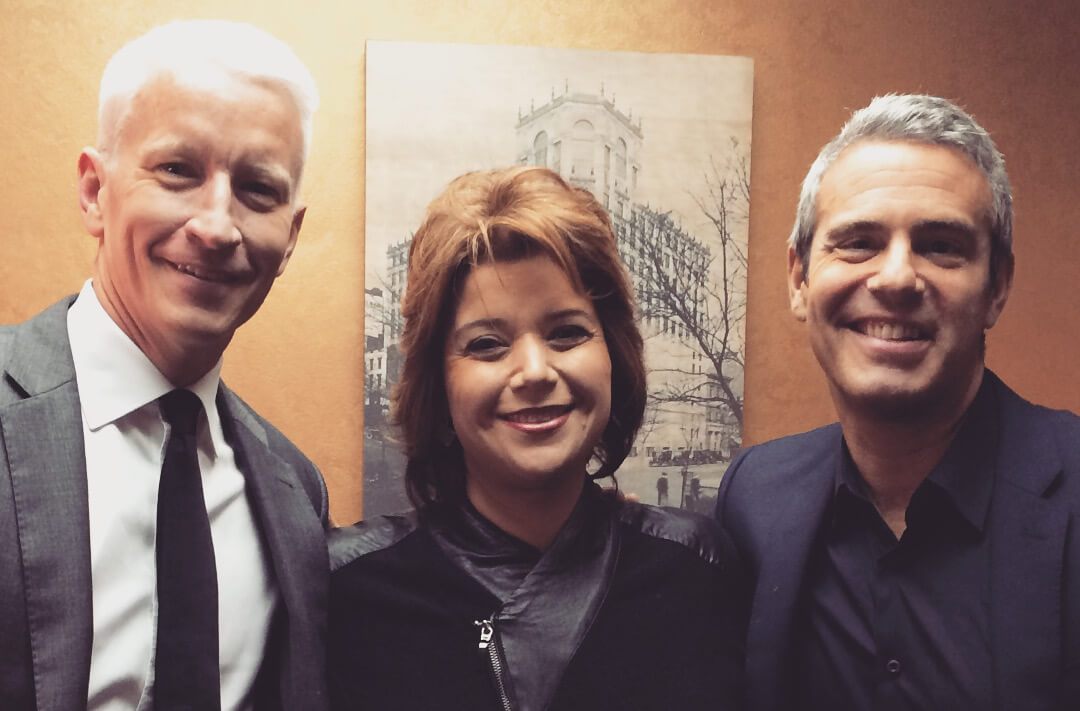8 de junio 2016

Children of Exile: The Births “Sowing Hope” in the Camp of Nicaraguan Farmers

PUBLICIDAD 1M
PUBLICIDAD 4D
PUBLICIDAD 5D
A commentator for networks such as CNN, ABC and Telemundo, she worked to stop the deportation of thousands of Nicaraguans residing in the US

Ana Navarro participates in the Republican Debate of the US. Photo: Courtesy.
Ana Navarro spends so much time traveling that her home address is Seat 3B, American Airlines. She says this jokingly, but the statement contains a bit of truth. At the height of this election season, this Republican strategist and political pundit for channels such as CNN, ABC and Telemundo goes from airplane to airline, crossing the United States in the path of these unpredictable primary elections.
A declared friend of politicians like Jeb Bush and Marco Rubio and a fierce opponent of Donald Trump’s candidacy (Trump has responded by demanding she be fired from CNN), Navarro’s voice of approval is coveted by both aspiring candidates and elected officials, according to media sources such as the Tampa Bay Times or the Miami News Times.
Broadcast live over the national channels, this Nicaraguan hurls pointed phrases, leads the cross-fire and defends her arguments before any and all comers, be they powerful figures, comedians, or fanatics. Advisor to Senator John McCain and Governor Jon Huntsman during their respective presidential campaigns, “she’s frank and loves controversy – whatever the topic,” McCain commented to the Tampa Bay Times.
Navarro’s words on Hillary Clinton: “I don’t need Hillary to drown me in estrogen every time she opens her mouth.” She referred to the choice between Ted Cruz and Donald Trump as a choice between “strep throat and leukemia”.
With nearly 26 thousand followers on Twitter, her responses to the tweets on this social network are clever, packing large enough doses of sarcasm to survive in the cybernetic jungle. Her tweets cover a little of everything: political commentary, autism, wine, Prince and Beyoncé.
The exile

Navarro was recently chosen by Ocean Drive Magazine as one of the eight women who are changing Miami "for good". Photo: Courtesy
Ana Navarro Flores was born in Chinandega on December 28, 1971. “I had a very happy childhood for a few years, until the civil war began,” she confesses. In 1980 she left for the United States, “thinking as so many exiles do, that it was only for a short time; never thinking that for me it was going to be a life-long change,” she notes.
She’s the youngest of four siblings: 2 sisters and 2 brothers. They left Nicaragua before the revolution because her father, Augusto “Tuto” Navarro was being persecuted as an opponent of the Somoza regime. They fled to Honduras and from there to Miami. She was enrolled in a Catholic school where she wasn’t the only Central American girl who had had to leave her country due to the political instability. Because of this, she describes the school as “a refugee camp” where the staff worked hard to teach them English.
She was always very decided in her studies. Her preferences were for thick books and political topics. From the time she was small, she worked as a campaign volunteer, she attended meetings, and went on the radio in support of the counterrevolution in Nicaragua. Her father was involved as a “Contra”. “At his side, watching him, I learned to become involved politically. I grew up very sensitive to the meaning of the political system and to the crises in Latin America,” she recalls.
With that in mind, she majored in Latin American Studies and Political Science at the University of Miami. After earning her B.A. there, she went on to become a lawyer.
During her law school years, the United States Congress passed a law ending the temporary residency permits for hundreds of Nicaraguans and Central Americans and declaring them “deportable.”
She then formed part of “a legal and legislative effort to stop that law and find solutions to the problem.” The effort was called NACARA – The Nicaraguan Adjustment and Central American Relief Act. There were strikes, masses, vigils to get it approved. She lobbied, looking for votes.
NACARA was approved in 1997. “Not only did it stop the deportation, but a law was passed granting legal status to certain Nicaraguans and Central Americans. It’s something that really touches your soul, it was momentous,” Navarro concludes.
In the supermarket line, while getting gas for the car, in the airport, everywhere she goes, Ana Navarro affirms, she is approached by people to tell her that they benefited from NACARA.
From CNN to Harvard
She began on CNN sometime in 2012. She doesn’t remember the exact day that they hired her, nor when she went on the air for the first time. However, since she began Ana Navarro is a common sight on the most important television channels in the United States: ABC, Telemundo, and CNN in Spanish. She was recently asked to participate on “The View”, an Emmy-winning talk show and one of the programs with the largest audiences in the country. Navarro was recently chosen by the magazine “Ocean Drive” as one of eight women who are changing Miami “for the better.”
Navarro, who’s been a Republican since she had “the use of reason,” began by offering her opinions for free. Later, contracts began to arrive and multiply, like her fame.
She believes that “it’s a little arrogant” to claim that she represents or speaks for anyone else when she’s on television. “I understand the great diversity of thinking that exists in the Latino community in the United States. We’re not a homogenous group. I offer my own opinions and speak my truth. Some share it; others think I’m crazy. There are times that even my own father disagrees with me.”
She appreciates the fact that young Hispanic women have come up to her to tell her “how much it means to them to see a Hispanic woman on television. There are very few of us in the United States media world. The political world here lacks diversity, lacks sufficient Hispanic voices and faces,” she emphasizes.
In the autumn of 2013, Navarro was asked to give classes at the John F. Kennedy School of Government at Harvard University. There, she met with a group of Hispanic students at their request. They were “students from very humble backgrounds, perhaps sons and daughters of gardeners, children of domestic workers, but they had been extraordinary students and with enormous effort and sacrifice they had come to study at Harvard,” she explains.
“It was one of the first times in my life that I realized how much influence I had, and how much it could mean, especially to the young who are trying to open a path in life, to see other people of the same nationality or the same culture who have achieved some degree of success in their lives.”
The price of criticizing Trump

Ana Navarro poses along with the journalist Anderson Cooper y the radio host Andy Cohen. Photo: Courtesy.
When she shoots off opinions regarding Donald Trump, the magnate and his followers respond in unison. In November 2015, they demanded that CNN fire her. The demand is still gathering signatures. The now-confirmed Republican candidate stated in his Twitter account: “CNN should listen. Ana Navarro has no talent, no personality on television and works for [the former Republican presidential candidate Jeb Bush] – a total conflict of interest.”
Those were the words with which this man that the establishment hasn’t managed to rein in backed the petition.
It’s neither the first nor the last time that they’ve gone for her. Navarro calls it “an occupational hazard.”
”I can’t support a candidate – even if he becomes my party’s candidate – who comes out with the hideous remarks that he’s made against women, against Hispanics, against immigrants; for me it’s simply impossible, it would mean selling out my principles and I’m not disposed to do that,” she asserts.
Donald Trump as president is a possibility she doesn’t even like to think about. “I don’t consider that Donald Trump is capable as a person, as a human being, of being president,” but “in the last ten months I’ve learned not to underestimate Donald Trump and not to overestimate Hillary Clinton, who’s a supremely weak candidate with many deficiencies,” she points out.
A dig through her Twitter account is enough to uncover innumerable astute, random, or acid commentaries: “If he could only let go of the Shakespearean drama and the pregnant pauses, maybe someday I’d be able to listen to (Ted) Cruz without an allergic reaction. Maybe.” “I called Trump infantile this morning in @NewDay. As a result, his followers have called me a “hypocrite,” a “c*nt”” and “an illegal” goes another of her tweets.
Navarro assures us that she doesn’t pause to digest what they’re saying about her, although –she confesses – it’s the first time in all of her political life that she’s heard, “the words, the insults, the terrible things that these people say, not only to me, but to people like me, every day.”
To be out there live on the air and touching on controversial issues, “you have to have the thick skin of a seal and not let the water penetrate,” she declares. Instead of paying for therapy, she buys shoes. She says she owns more than the average person, but fewer than Imelda Marcos, widow of the Philippine ex-dictator Ferdinand Marcos, whose collection included around a thousand pair.
Married and residing in Coral Gables, this friend of Willy Chirino and of Gloria and Emilio Estefan goes for wine, cosmopolitan cities and the books of Gabo (Gabriel Garcia Marquez) and Jorge Amado. She speaks English, Portuguese, and a little French. She enjoys cooking and it’s personally difficult for her to visit Nicaragua, a country she hasn’t traveled to in more than a decade.
“Between the death of my brother (in 2002) and the election of Daniel Ortega, Nicaragua has become a place of conflicting feelings for me and one that has brought me great pain. I can’t reconcile with the idea that Daniel Ortega has once again become the president of Nicaragua. It’s incomprehensible to me,” she confesses.
There are no surplus hours in the day for Navarro, only too few. She’s always busy and in action. She counts every drop of time she gives, and it’s anguishing to her to be disconnected from the Internet, as happens every time she gets into an airplane. The idea that a breaking news item might escape her is unbearable. She must be on the air. She must let go with a tweet…
This article has been translated from Spanish by Havana Times.
Read the original version here.
Archivado como:
PUBLICIDAD 3M
PUBLICIDAD 3D